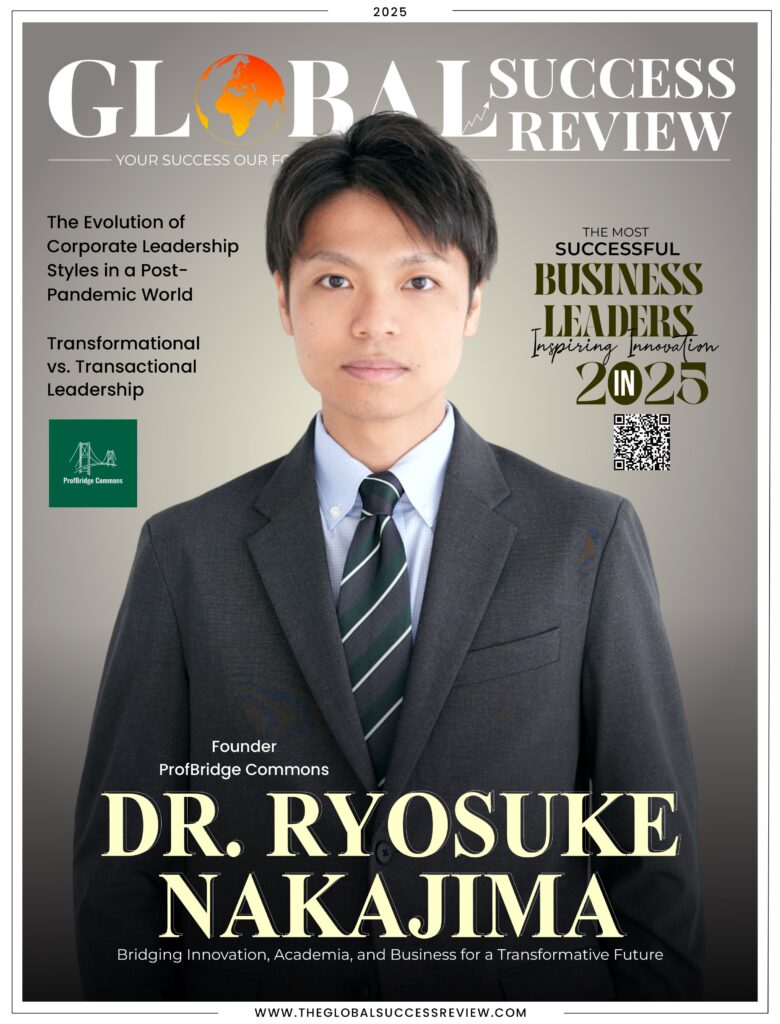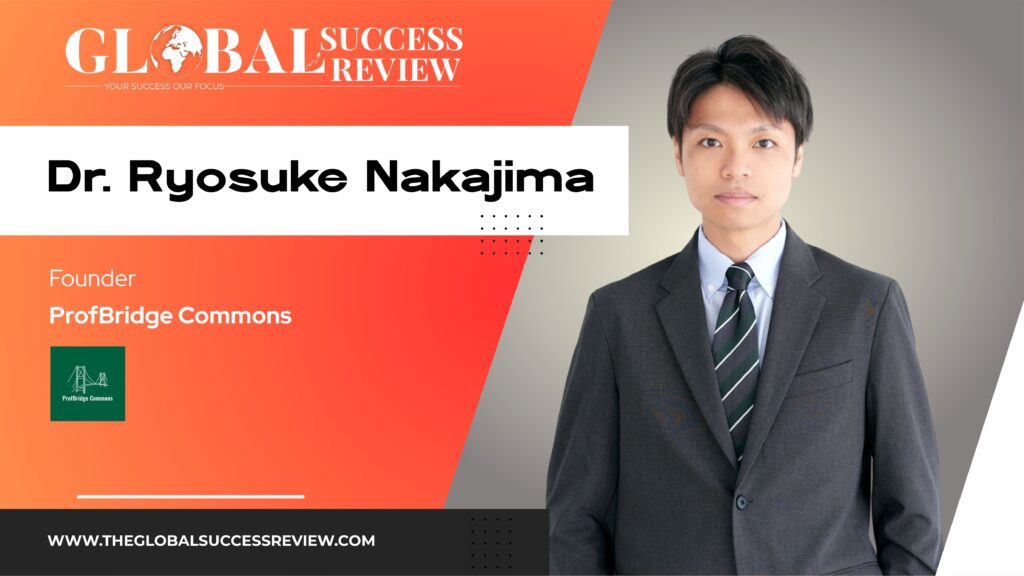In a world where technology and business are evolving at breakneck speed, few leaders manage to navigate the crossroads of innovation, research, and practical business strategy as effectively as Dr Ryosuke Nakajima. Renowned for his unique ability to connect academia with the corporate world, Nakajima has spent over a decade shaping strategies that empower organisations to innovate responsibly, harness emerging technologies, and embrace sustainable growth. His work as a management consultant, academic, researcher, and founder of Prof Bridge Commons exemplifies the power of bridging theory and practice, enabling transformative outcomes that impact industries globally.
A Vision Shaped by Purpose and Possibility
Nakajima’s journey into management consulting was fueled by a desire to combine problem-solving with real-world impact. “I was drawn to consulting by its unique ability to combine problem-solving with impact at scale,” he reflects. Early in his career, the focus was on delivering effective solutions for clients. But over time, his vision expanded: consulting was no longer just about resolving issues; it became about fostering transformation.
“Today, I see consulting as enabling transformation, bridging innovation from academia and technology into business practice,” Nakajima explains. It is this integrative perspective that distinguishes him from traditional consultants. Rather than offering isolated solutions, he seeks to cultivate ecosystems where ideas can thrive, technologies can be tested, and strategies can be implemented with enduring impact.
This vision is informed by his leadership philosophy, a dynamic balance of collaboration and purposeful direction. Nakajima describes his style as “collaborative yet purposeful,” adapting to the needs of consulting, research, and academia alike. “In consulting, I focus on clarity and results. In academia, I emphasise curiosity and critical thinking. In research, I encourage rigour and creativity. Adaptability comes from asking: What does this context need most from me as a leader?”
Leading at the Intersection of Disciplines
Dr Nakajima’s work exists at a rare confluence of business, technology, and academia. He understands that innovation without stability is fleeting, and stability without innovation leads to stagnation. His approach is anchored in long-term strategy, ensuring that cutting-edge initiatives are guided by a steady, purpose-driven compass.
“Technology evolves at incredible speed, but organisations cannot afford to change direction with every new trend,” he observes. “Strategy must provide the enduring compass, while innovation becomes the engine that adapts the journey along the way.”
Nakajima employs a virtuous cycle: research generates new possibilities, consulting applies them in practice, and teaching ensures continuity. Through this integration, innovation becomes embedded in organisational culture, sustainable, measurable, and resilient. “A truly innovative organisation is one where experimentation is encouraged, failures are treated as learning opportunities, and ideas can flow freely across levels and functions,” he notes.
For Nakajima, inspiring innovation goes beyond generating new ideas; it’s about creating the conditions where creativity becomes habitual. “Professionally, it means embedding innovation into systems and cultures so that it is not dependent on any single leader or visionary. Ultimately, inspiring innovation is about ensuring that creativity and progress become sustainable habits rather than isolated moments.”
Navigating Defining Challenges
No leadership journey is without challenges. For Nakajima, one of the most defining was balancing his multiple roles, consultant, academic, and researcher, without losing focus. “I overcame it by learning to align them rather than separate them. Today, each role feeds the other: my consulting brings practical insights to research, and my teaching sharpens my consulting,” he explains.
Early career challenges shaped his approach to problem-solving profoundly. Faced with uncertainty and incomplete information, Nakajima learned to combine structured thinking with flexibility, scenario-based planning, and decisive action. This mindset became the foundation for his consulting methodology and academic inquiry alike.
A turning point came during his doctoral research on the metaverse in B2B sales. At a time when immersive technologies were largely dismissed as futuristic speculation, Nakajima demonstrated how virtual environments could transform trust, collaboration, and value creation in relationship-driven industries. This insight cemented his belief that technology is more than a tool; it is a catalyst for reimagining entire business models.
A Career Built on Integration and Impact
Nakajima’s professional journey reflects a continuous effort to integrate seemingly disparate domains. He began in consulting, mastering structured problem-solving and client management. Teaching soon followed, allowing him to pass on knowledge to emerging leaders. Research added depth, enabling him to analyse long-term trends and rigorously evaluate innovation frameworks. Ultimately, the founding of Prof Bridge Commons created a platform to unite these worlds, connecting professionals, academics, and students globally.
“My consulting gives me direct exposure to the challenges businesses face. Research provides the frameworks to analyse those challenges deeply. Teaching allows me to test ideas and inspire the next generation. Each role enriches the other, creating a coherent mission focused on impact,” Nakajima says.
Among his proudest achievements is bridging academia and business in practical ways. “Building Prof Bridge Commons, where professionals and academics collaborate globally, represents that bridge at scale,” he explains.
Driving Innovation Through Research
Nakajima’s research focuses on digital transformation, AI, and CRM strategies, domains reshaping the core of business operations. Digital transformation is no longer a side project; it is integral to organisational efficiency, talent management, and operational design. AI enhances decision-making, increasing speed and precision, while CRM strategies ensure customer-centricity remains central.
“These forces are pushing businesses to operate not just more efficiently, but more intelligently and empathetically,” Nakajima asserts.
His work on the metaverse exemplifies this approach. By demonstrating how immersive environments can enhance collaboration, co-creation, and global connectivity in B2B contexts, he positioned virtual spaces as practical tools for innovation rather than theoretical curiosities. “The game-changing element lies in how it fuses intimacy with accessibility, allowing businesses to form deeper partnerships while expanding reach,” he notes.
In the realm of generative AI, Nakajima explores the delicate balance between innovation and ethical responsibility. “Paradoxes in AI cannot be permanently solved; they must be actively managed. Leaders must embed ethical considerations into decision-making while fostering experimentation,” he advises. This dynamic equilibrium ensures organisations innovate responsibly, sustaining trust internally and externally.
Prof Bridge Commons: Bridging Knowledge and Practice
A cornerstone of Nakajima’s mission is Prof Bridge Commons, a global platform designed to connect professionals, students, and academics in real time. “There is often a gap between what is taught in classrooms and what is practised in boardrooms,” he observes. Prof Bridge Commons closes that gap by enabling collaborative problem-solving, rapid prototyping, and knowledge exchange across borders.
Unlike traditional academic-industry partnerships, Prof Bridge Commons is continuous, borderless, and human-centred. “We don’t just connect universities and companies; we connect people, ideas, and lived experiences,” Nakajima explains.
Even in its early stages, Prof Bridge Commons has proven transformative. Professionals share real-world case studies, students challenge assumptions, and academics refine frameworks to address practical business needs. The result is a living lab of innovation, where ideas evolve from theory into actionable strategies.
Over the next five years, Nakajima envisions Prof Bridge Commons scaling into a global ecosystem, turning academic insights into tangible, deployable solutions. “Innovation thrives when theory and practice move in tandem. By combining rigorous academic insight with rapid prototyping and real-world feedback, we create mechanisms that continuously turn ideas into tested, living practices,” he asserts.
Personal Philosophy: Grounded in Heritage and Humanity
Beyond professional accomplishments, Nakajima draws strength from his heritage and family. His Japanese upbringing instilled discipline, respect, and long-term thinking, while his international academic experience nurtured openness, agility, and diversity.
“I live in a diverse family environment, my wife is French, and together with our daughter, we navigate multiple cultures daily,” he shares. “This constant bridging of perspectives reinforces my professional mission of connecting disciplines and fostering global collaboration.”
Mentorship and resilience have also been pivotal. Early setbacks taught him that failure is not an endpoint but a pivot, shaping his approach to leadership as a combination of transparency, empathy, and courage. He believes the best leaders enable others to grow, even before they are ready to lead themselves, a principle he now applies to consulting, teaching, and research alike.
Leadership Legacy: Connecting Generations, Technology, and Ideas
Looking ahead, Nakajima aspires to leave a legacy that spans industries, generations, and disciplines. “I hope my work will build bridges between academia and business, between technology and humanity, and between generations of leaders,” he explains.
Too often, these domains operate in isolation: academic insights remain confined to journals, corporate innovation lacks ethical grounding, and younger leaders struggle to translate aspirations into actionable strategies. Through Prof Bridge Commons and his integrated approach to consulting, research, and education, Nakajima seeks to dismantle these silos.
“If my efforts contribute to creating systems where innovation and ethics grow hand in hand, where companies scale responsibly, where classrooms become living labs of practical insight, and where future leaders inherit not just knowledge but wisdom, that would be the legacy I aspire to,” he reflects.
Inspiring Innovation for a Global Future
Dr Ryosuke Nakajima embodies a new paradigm of leadership, one that balances curiosity with discipline, technology with humanity, and innovation with ethical responsibility. His career demonstrates that true impact arises not from isolated achievements but from connecting ideas, people, and disciplines in meaningful ways.
As 2025 approaches, Nakajima’s influence continues to grow, inspiring organisations, students, and leaders worldwide to embrace innovation responsibly, think expansively, and bridge the worlds of theory and practice. In an era of constant disruption, his message is clear: progress is most powerful when grounded in collaboration, integrity, and the courage to imagine what has not yet been realised.
Through his work with Prof Bridge Commons, research on digital transformation and AI, and leadership across consulting and academia, Nakajima is more than a thought leader; he is a bridge-builder, a mentor, and a visionary guiding the next generation of leaders to think boldly, act responsibly, and innovate for a better, more connected world.
Connect with Dr Ryosuke Nakajima
Founder – Prof Bridge Commons
Consultant | Professor | Researcher
Location: Tokyo, Japan / Global



